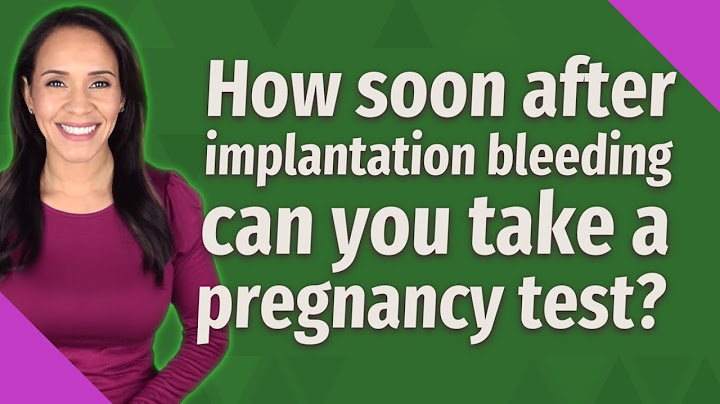When you're trying to get pregnant, your senses are on high alert for any indication that you're officially a parent-to-be. One of the earliest pregnancy symptoms can be implantation bleeding, which happens when the fertilized egg implants into the lining of the uterus. About one-third of pregnant people will experience implantation bleeding, according to the American Pregnancy Association, and it often resembles a light period. Here's everything you need to know. Show
When Does Implantation Bleeding Occur?Only about one-third of people experience implantation bleeding in early pregnancy. If it happens to you, it will occur 10 to 14 days after fertilization, says Lauren Barlog, M.D., assistant professor in the Department of Obstetrics, Gynecology and Women's Health at Rutgers NJ Medical School. "It typically occurs around the time of your next expected period." In fact, because of the timing, some people might confuse implantation bleeding for a light menstrual period. They don't realize what it is until a pregnancy test comes up positive, says Zev Williams, M.D., Ph.D., chief of the Division of Reproductive Endocrinology and Infertility at Columbia University Medical Center. What Does Implantation Bleeding Look Like?Implantation bleeding will probably look different than your normal monthly period. The color usually ranges from light pink to dark brown (period blood is typically red), and it doesn't contain any clots. Also, implantation bleeding is usually lighter than a menstrual period. Some people don't even notice it at all—or they see a small amount of blood when they wipe. In some cases, implantation cramping can occur along with the bleeding. How Long Does Implantation Bleeding Last?Typically, implantation bleeding appears for a day or two (though some people only bleed for a couple of hours). Rather than consistent blood flow, it might be off-and-on. How Soon After Implantation Bleeding Will You Get a Positive Pregnancy Test?If you think you're experiencing implantation bleeding, what's the best course of action? Take a pregnancy test, says Dr. Barlog. Every test has a different threshold for sensitivity, but the absolute earliest you should take one is about four or five days before your expected period, says Dr. Williams. Otherwise there might not be enough pregnancy hormone (hCG) to give a positive result. If the pregnancy test is negative, repeat it in a few days. When Should I Visit the Doctor?Implantation bleeding isn't cause for concern, but if you're experiencing unusual spotting, it's important to recognize when symptoms might require a visit to the doctor. "If you are spotting but also have pain that's concentrated on one side, rectal pain, or a history of infertility or tubal disease, you should see a doctor immediately," says James Segars, Jr., M.D., director of Reproductive Science and Women's Health Research, and a professor of gynecology and obstetrics at Johns Hopkins Medicine. "These are signs that you could have a tubal or ectopic pregnancy, when the fertilized egg implants somewhere other than the uterus, usually within the fallopian tubes." And you also should see your doctor if you've had bleeding or spotting between periods for several months, because you may be dealing with other conditions such as fibroids or polyps. We include products we think are useful for our readers. If you buy through links on this page, we may earn a small commission. Here’s our process. The best time to take a pregnancy test is a the week after a missed period. Some tests may detect pregnancy 1-2 weeks after intercourse, but the body needs time to increase its levels of HCG. Testing before a missed period can increase the risk of a false negative result. Think you might be pregnant? Even with the most effective birth control methods, there’s always a chance for error. After all, it takes just one sperm to fertilize the egg. Finding out whether or not that’s happened is as easy as taking an over-the-counter (OTC) pregnancy test. OTC pregnancy tests typically test your urine for a hormone called human chorionic gonadotropin (HCG). HCG is only present if you’re pregnant. The hormone is only released if a fertilized egg attaches outside the uterus or to your uterine lining. There are different ways to collect your urine for the test. Depending on the test you choose, you may have to:
According to Cleveland Clinic, most tests are 99 percent effective if taken after a missed period. The best part is that you can do it in the privacy of your own home. Simply open the test, follow the instructions, and wait for the recommended amount of time to view the results. After the recommended waiting time has passed, the tests will display your results in one of the following ways:
You should wait to take a pregnancy test until the week after your missed period for the most accurate result. If you don’t want to wait until you’ve missed your period, you should wait at least one to two weeks after you had sex. If you are pregnant, your body needs time to develop detectable levels of HCG. This typically takes seven to 12 days after successful implantation of an egg. You may receive an inaccurate result if the test is taken too early in your cycle. Here are some signs that you should take a pregnancy test. Share on PinterestOne of the first and most reliable signs of pregnancy is a missed period. If you don’t track your cycle closely, it might be hard to determine whether or not you’re late. Many women have a 28-day menstrual cycle. Consider taking a test if it’s been more than a month since your last period. Keep in mind that your period can sometimes be delayed or skipped due to stress, diet, exercise, or certain medical conditions. Also pay attention to your flow if you suspect pregnancy. It’s common to experience light bleeding or spotting in the early weeks as the egg buries deeper into the uterine lining during implantation. Take note of any difference in the color, texture, or amount of blood. Contact your doctor if you have bleeding and a positive pregnancy test. Share on PinterestImplantation can also produce a feeling similar to menstrual cramps. In early pregnancy, you may feel this discomfort and think your period is just around the corner, but then it never comes. Sound familiar? Take a test. Hormone levels vary by woman and by pregnancy. Share on PinterestAs your pregnancy produces more and more estrogen and progesterone, these hormones start to make changes in your body to support the baby’s growth. Your breasts may feel tender and appear bigger due to increased blood flow. Your nipples might hurt and the veins might look darker under the skin. Because many women also experience breast discomfort in the days leading up to their period, this symptom isn’t always indicative of pregnancy. Share on PinterestAlong with cramps and sore breasts, early pregnancy can cause:
As the weeks go on, these symptoms may get stronger before your HCG levels even out late in the first trimester. You know yourself, so pay attention to your body. Any unusual physical symptoms could prompt you to take a pregnancy test. Share on PinterestBirth control pills, condoms, and other types of contraceptive devices don’t provide 100 percent protection from pregnancy. In other words, there’s always a slight chance of pregnancy, no matter how careful you are. Despite your birth control preferences, consider taking a test if you experience any of the signs we’ve listed. Human error or defects can also result in unplanned pregnancy. Birth control pills can be difficult to remember to take each day. According to Planned Parenthood, 9 out of every 100 women on the pill will get pregnant if they don’t take it as directed. Condoms can break and tear or otherwise be used incorrectly. According to Planned Parenthood, nearly 18 in every 100 women relying on condoms for contraception get pregnant each year. If you’re worried about contraceptive failure, ask your doctor about alternative contraceptive methods, such as an intrauterine device (IUD). According to Planned Parenthood, less than one out of every 100 women using an IUD gets pregnant each year. Sexually active women in their reproductive years have a chance of pregnancy every month, even when using protection. There are certain signals your body might send that should prompt you to take a pregnancy test. For the best results, take the test after you think you’ve missed your period. Test during your first morning bathroom visit, or hold it for several hours to increase the concentration of the HCG hormone that the test measures. Testing early helps to ensure that you get proper care for yourself and, if applicable, prenatal care for your baby. In the event of a positive result, contact your doctor as soon as possible to discuss your options and potential next steps. How long should I wait to test after implantation bleeding?About four to five days after implantation bleeding, HCG levels in the body reach detectable levels in the blood. For at-home urine pregnancy tests, it may take up to 7 days for HCG levels in the urine to reach detectable levels for testing.
How long after implantation will you test positive?If you are pregnant, your body needs time to develop detectable levels of HCG. This typically takes seven to 12 days after successful implantation of an egg. You may receive an inaccurate result if the test is taken too early in your cycle.
|

Related Posts
Advertising
LATEST NEWS
Advertising
Populer
Advertising
About

Copyright © 2024 paraquee Inc.
















